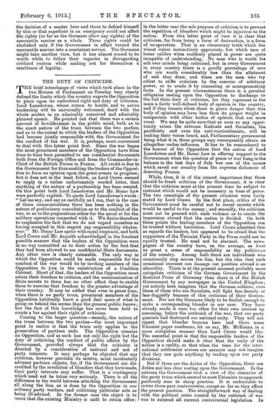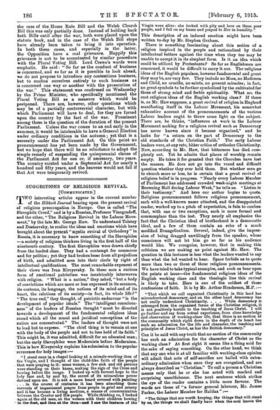THE DUTY OF CRITICISM.
THE brief interchange of views which took place in the two Houses of Parliament on Tuesday very clearly defined the limits which the country expects the Opposition to place upon its undoubted right and duty of criticism. Lord Lansdowne, whose return to health and to active leadership will be universally welcomed, dealt with the whole matter in an admirably conceived and admirably phrased speech. He pointed out that there was a certain amount of bewilderment in the public mind, both as to the exact nature of the truce between the two parties, and as to the extent to which the leaders of the Opposition had become jointly responsible with the Government for the conduct of the war. It is, perhaps, more convenient to deal with this latter point first. Since the war began the most prominent members of the Opposition have from time to time been permitted to see confidential documents both from the Foreign Office and from the Commander-in- Chief of the British Forces in France. All credit is due to the Government for thus enabling the leaders of the Opposi- tion to form an opinion upon the great events in progress; but it does not in the least follow, as Lord Crewe seemed to imply in a rather unfortunately worded letter, that anything of the nature of a partnership has been created. On this point both Lord Lansdowne and Mr. Boner Law were perfectly explicit. To quote Lord Lansdowne's words : " Let me say, and say as carefully as I can, that in the case of these communications there has been nothing in the nature of preliminary consultation as to the conduct of the war, or as to the preparations either for the naval or for the military operations connected with it. We desire therefore to emphasize the fact that we do not regard ourselves as having accepted in this respect any responsibility whatso- ever." Mr. Boner Law spoke with equal emphasis, and both Lord Crewe and Mr. Asquith acknowledged in the frankest possible manner that the leaders of the Opposition were in no way committed as to their action by the fact that they had been allowed to see confidential State documents. Any other view is clearly untenable. The only way in which the Opposition could be made responsible for the conduct of the war would be by inviting members of the Opposition to join in the construction of a Coalition Cabinet. Short of that, the leaders of the Opposition must retain their freedom to criticize, and the communication of State secrets to them has no other effect than to enable them to exercise that freedom to the greater advantage of their country. It may be added that even in peace time, when there is no party truce, prominent members of the Opposition habitually know a good deal more of what is going on behind the scenes than the general public knows ; but the fact of this knowledge has never been held to create a bar against their right of criticism.
Coming to the larger question—namely, the nature of the truce between the two parties—the most important point to realize is that the truce only applies to the prosecution of partisan ends. The Opposition remains an Opposition, and as such has not only the right but the duty of criticizing the conduct of public affairs by the Government, provided always that the criticism is directed by a consideration of national and not of party interests. It may perhaps be objected that any criticism, however patriotic its motive, must incidentally advance partisan objects, for, if the Government are dis- credited by the revelation of blunders that they have made, their party interests may suffer. That is a contingency which need not be taken very seriously. There is all the difference in the world between attacking the Government all along the line, as is done by the Opposition in our ordinary party warfare, and criticizing particular acts as being ill-advised. In the former case the object is to -nova that the existing Ministry is unfit to retain office ;
in the latter case the sole purpose of criticism is to prevent the repetition of blunders which might be injurious to the nation. From this latter point of view it is clear that criticism, far from being a form of destruction, is a form of co-operation. That is an elementary truth which the wisest rulers instinctively appreciate, but which men of lesser calibre when suddenly placed in power are quite incapable of understanding. No man who is worth his salt ever minds being criticized, but in every Government in every country there is a goodly percentage of men who are worth considerably lees than the allotment of salt they draw, and these are the men who try either to stifle criticism by the exercise of arbitrary power, or to evade it by concealing or misrepresenting facts. In the present circumstances there is a peculiar obligation resting upon the Opposition to discharge to the full their duty of criticism, for they represent in the main a fairly well-defined body of opinion in the country, and if they remain silent there is grave danger that this body of opinion may have less than its proper weight in comparison with other bodies of opinion that are more vocal. We may be quite sure that as soon as any oppor- tunity arises the extreme Radicals and Socialists, the pacificists, and even the anti-vaccinationists, will be making their voices heard, and, Parliamentary government being what it is, these groups may consequently obtain an altogether undue influence. It has to bo remembered to the honour of the Opposition that the action of Lord Lansdowne and Mr. Boner Law in offering support to the Government when the question of peace or war hung in the balance in the last days of July was one of the causes which saved our country from the supreme dishonour of deserting France.
While, then, it is of the utmost importance that there should be frank criticism of the Government, it is clear that the criticism must at the present time be subject to restraint which would not be necessary in time of peace. The two essentials of the present situation were fairly stated by Lord Crewe. In the first place, critics of the Government must be careful not to reveal secrete which would be useful to the enemy; and secondly, the criticism must not be pressed with such violence as to create the impression abroad that the nation is divided. On both these points the leading members of the Opposition can be trusted without hesitation. Lord Crowe admitted this as regards the leaders, but appeared to be afraid that the supporters of the Unionist Party in the Press could not ho equally trusted. He need not be alarmed. The news- papers of the country have, on the average, as least as great a sense of responsibility as the politici:mts of the country. Among both there are individuals who occasionally step across the line, but the idea that such occasional excesses can damage our position abroad is an absurdity. There is at the present moment probably mom outspoken criticism of the German Government by the Socialist Press of Germany than there is of the British Government by any newspaper in the United Kingdom; yet nobody here imagines that the German soldiers, even those of them who are Socialists, will fight less fiercely or less doggedly because of this criticism of their Govern- ment. Nor are the Germans likely to be foolish enough to make a corresponding blunder in our case. They Lava already made it once too often for their own interest by assuming, before the outbreak of the war, that our party quarrels had destroyed our national unity. They will not repeat that blunder because here and there some Unionist paper condemns, let us say, Mr. McKenna in a more outspoken manner than Lord Crewe would like. The essential point is that the responsible leaders of the Opposition should make it clear that the unity of the nation is a reality, so that when the time for the inter- national settlement arrives our enemies may not imagine that they can gain anything by trading upon our party divisions.
But if these are the duties of the Opposition, there are duties not less clear resting upon the Government. In the autumn the Government took a view of the character of the party truce which seemed to most Unionists to approach perilously near to sharp practice. It is undesirable to revive those past controversies, except so far as they affect the present position. The straightforward way of dealing with the political crisis created by the outbreak of war was to suspend all current controversial legislation In the case of the Home Rule Bill and the Welsh Church Bill this was only partially done. Instead of holding back both Bills until after the war, both were placed upon-the statute book, and in the case of the Welsh Bill steps have already been taken to bring it into operation. In both these cases, and especially in the latter, the Opposition have a real grievance. Happily this grievance is not to be accentuated by similar procedure with the Plural Voting Bill. Lord Crewe's words were emphatic. He said " So far as the conduct of business is concerned, and so far as it is possible to look ahead, we do not propose to introduce any contentious business, but to confine ourselves entirely to such business as is concerned one way or another with the prosecution of the war." This statement was confirmed on Wednesday by the Prime Minister, who specifically mentioned the Plural Voting Bill as a measure which would be postponed. There are, however, other questions which may be of a partially controversial character, but with which Parliament will have to deal, for they are forced 'open the country by the fact of the war. Prominent among these is the question of the duration of the present Parliament. Unless the war comes to an end early in the summer, it would be intolerable to have a General Election ender ordinary conditions in the autumn ; yet that is a necessity under the Parliament Act. On this point no pronouncement has yet been made by the Government, but we hope that there will be no reluctance to adopt the simple remedy of suspending the quinquennial clause of the Parliament Act for one or, if necessary, two years. The country existed under a Septennial Act for nearly a hundred and fifty years, and the heavens would not fall if that Act were temporarily revived.







































 Previous page
Previous page